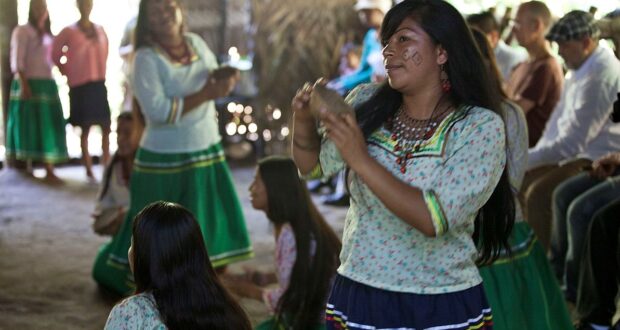30 October, 2021
By Jessica Honan – Research Assistant
Ecuador amended its Constitution in 2008 to recognise the Indigenous languages of Kichwa and Shuar as constitutional, or ‘intercultural’ languages, alongside the widely spoken Spanish. This change to the Constitution accompanied an overhaul of the document by leader Rafael Correa after he took leadership in 2006. Though the President was himself allegedly against the recognition of Shuar and Kichwar, his party was overwhelmingly in favour and Ecuador’s Constituent Assembly agreed by majority to include the languages. The new constitution went to referendum in September 2008, where the majority of Ecuadorians voted to constitutionally recognise Shuar and Kichwar alongside Spanish as ‘intercultural languages’. Spanish remained the ‘official language’ and other indigenous languages became recognised as ‘other ancestral languages / used officially by indigenous peoples in the areas they inhabit’. Until this change in 2008, Indigenous languages were legally relegated to the Indigenous groups that spoke them. By contrast, the new constitution recognises that the Indigenous languages are to some extent reflective of Ecuador in general.
Ecuador has a long history of social divide through civil warfare, colonisation that led to conflict, dictatorships, military leadership, coups and political and Constitutional turmoil. Combined with the diverse geography separating peoples and the large amount of different ethnic groups within Ecuador, this history is conducive to a disunified State. Spanish therefore plays an important role in creating some unity. 97% of the population of Ecuador can speak Spanish, and the Constitution’s foremost recognition of the fact signalises that despite all other differences – namely the history of separation– there is at least one commonalty that can unite Ecuador’s people. The universality of Spanish allows for people who are otherwise quite different to interact, integrate and communicate.
Nonetheless, the inclusion of Indigenous languages in the Constitution is an important step towards bridging the divide created by a history of discrimination against Indigenous peoples. An estimated 1.1 million Ecuadorians identify as being from one of 14 different Indigenous nations, yet the country has had a history of marginalising and disenfranchising ethnic groups. Land was – and is sometimes still – seized from Indigenous groups, forcibly displacing peoples and cultures. During the Amazon rubber boom, Indigenous people were used as slave labour on rubber plantations. In the last century, Indigenous languages were largely banned. However, the constitutional amendments recognise the existence, and sub textually the value, of Indigenous languages in Ecuador. In this way, it represents a step towards embracing the country’s ethnic diversity. The three languages, side by side in the constitution, have the political effect of bringing about some unity and reconciliation in Ecuador.
The Constitutional recognition of Indigenous languages in Ecuador allows for the preservation and celebration of Ecuadorian culture. Recognising the two indigenous languages alongside Spanish illustrates that, although Ecuadorian indigenous peoples have suffered a history of conflict, categorisation, minoritisation and often disenfranchisement, their languages and by association their cultures are worthy of being, and valuable enough, to be considered representative of Ecuador. Homero Paucar, an advocate of teaching indigenous languages, notes that the proliferation of indigenous languages will ensure indigenous people are ‘proud of who they are’ and that they ‘[do not feel] shame about their identity’. Yet not only does this status indicate that these languages are important enough to represent Ecuador, it also indicates that they are constitutive of Ecuador – that these languages contribute to what it means to be Ecuadorian. In this way, the recognition of these languages as official languages is a celebration of the heterogeneity of Ecuador and the history of its diverse communities.
This in turn contributes to the preservation of the culture associated with these languages. If value is seen in these languages and cultures, it is more likely efforts will be made to preserve them. This desire to preserve language is clearly exemplified by Ecuador’s attempted return to their pre-1988 education model, which promotes the teaching of indigenous languages in schools. Ecuador’s Indigenous Bilingual Intercultural Education strategy recognises the value in ensuring the longevity of these languages by ensuring children are learning them and valuing them. As the formation of culture is closely linked to language, teaching indigenous languages inherently also involves teaching culture, and thus contributes to preserving these cultures.
The case of Ecuador has shown that language can be a political tool for contributing to the unification of a diverse country. The inclusion of all of the languages in the Ecuadorian Constitution plays an important political role. Whereas Spanish serves to bring together a group of linguistically and ethnically diverse people, the Constitutional recognition of Kichwa and Shuar represents Ecuador’s history, its progress and the reality of the people that make up the country itself. This preservation and celebration further contributes to the unification of Ecuador, by ensuring all peoples within the diverse country feel valued and respected. Ecuador’s changes are relatively recent and the long-term consequences are yet to be fully established. The action of amending the Constitution alone is not enough to fully heal all of the divisions within Ecuador, and tensions still exist. However, Ecuador’s progress could serve as a model for facilitating reconciliation and unity in other ethnically-diverse countries.
Image: the Foreign Minister of Ecuador visits Kichwa Añangu community in Yasuní National Park (Source: Cancillería Ecuador via CC BY-SA 2.0)
 Human Security Centre Human Rights and International Security Research
Human Security Centre Human Rights and International Security Research




